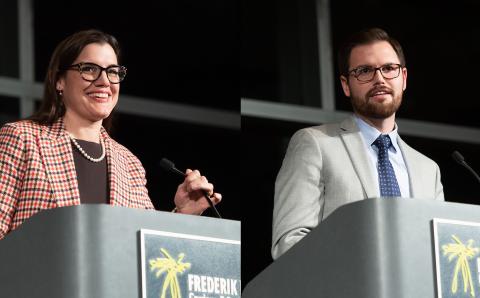I have played piano for two decades now, one decade of which was aimed solely at making it my career. I am no stranger to the drive for excellence in musical pursuits—or any artistic pursuit, for that matter. However, it wasn’t until a few years ago that I realized just how much my idea of artistic excellence was in conflict with my faith.
All I really remember about my first few years of lessons is that I wanted to play. My brother and sister both played, and it looked like fun. When I started, it was the pure joy of creating something beautiful and meaningful out of nothing. Poof—Beethoven’s “Moonlight Sonata.” Just by pressing down white and black keys, I could make tears come to my mom’s eyes. How cool is that?
During my teen years, I got serious. As a teenager and college student, I entered wholeheartedly into my craft. I was good at piano; people liked it when I played, and I had fun doing it. Everybody told me I should pursue it as far as I could go, educationally and otherwise; that I had a career ahead of me. So I pushed ahead. I began placing higher and higher value on the affirmation and criticism of others. I began to fear performing. I began to stress out about recitals and competitions and master classes.
To avoid what I perceived as the cardinal sin of the musician—messing up in performance—I pushed myself harder. I practiced more, memorized every page, made sure every note was as perfect as possible. I rationalized this concoction of pride and fear by labeling it “pursuing excellence.” That somehow rang better in my ears than “self-aggrandizing” or “wildly afraid of failing.” In fact, I think that’s where it all intersected: in my teenage Christian life, I was struggling deeply with the shame of sins I couldn’t shake and, at the same time, with the desire to be admired for my holiness in front of my peers. Naturally, this spilled into my musical life.
As a young pianist, if I didn’t do well on a performance I blamed it on everything from letting my pride get in the way to not practicing hard enough. It most certainly would have been wiser to memorize Bach than memorize the Lost Woods maze sequence from the video game “The Legend of Zelda: Ocarina of Time” (a hypothetical situation, of course, but if you’re interested: right, left, right, left, straight, left, right). The point is that it came down, somehow, to not loving the Lord enough to discipline myself and work hard. Because after all, God is the one who gave me my abilities, and wouldn’t it be a waste of those God-given gifts to not work hard(er) on them? And isn’t that what God wants—for us to hone our talents for his glory?
The arts are complex and wonderful gifts. The ability to manipulate sound into exquisite sonic patterns can rip a soul apart or mend it. The opportunity to mix and match colors, lines, textures, and shapes can represent something of profound meaning. One can communicate depth of feeling and truth with little black lines and arcs on a blank page. These gifts are neither small nor simple, and therefore not easily mastered, if ever. Thus we have a joyous responsibility to play skillfully, to seek excellence in our craft. Such truth and beauty are worth pursuing.
But in my heart, my pursuit of excellence was centered on who I was and who I hoped to become rather than on being made new in Jesus Christ.
Fast-forward to my first few years of college, when I was wrapping my dreams for the future around my craft. The breaking point came during my senior year when I performed abysmally during a master class for a visiting pianist. I remember vividly the anger and disillusionment I felt afterward. I was simply not good enough to make a living, to get noticed, to be famous, to achieve whatever it was I was searching for. At that moment I felt lost. If I didn’t have my musical ability, what did I have?
But this experience pushed me to a living truth: I associated doing the best that I could at my craft with who I was. In this vein, my struggle to perfect my art mirrored my struggle to perfect myself.
This slowly became evident to me. Accumulated shame, disillusionment, and a class about unity with Christ converged. And gradually I realized what I had been avoiding all along—that in Christ, my identity is not mine to form or control (thank God!). I remember actually crying from the relief of this truth finally penetrating my heart.
It’s often difficult to put this knowledge into practice. I can realize I’m out of shape, but until I get up off the couch and exercise, there will not be a transformation. That is where I am now— struggling to relinquish control while striving to live a holy life. It seems like an oxymoron, but mostly what it’s done is to bring me to my knees a lot.
I regularly speak these words to my forgetful self:
Excellence is not beating myself up until I get it right.
Excellence is not what defines the success of my art.
Excellence is not an indicator of how much I love God.
Excellence is not designed to impress Christ enough that he loves me.
Choosing to pursue that which excels—the joyous, the peaceful, the living, the holy, the viscerally true—is a real thing, motivated by real love. That familiar maxim of the apostle Paul takes on an identity focus: “Finally, brothers and sisters, whatever is true, whatever is noble, whatever is right, whatever is pure, whatever is lovely, whatever is admirable—if anything is excellent or praiseworthy—think about such things” (Phil. 4:8).
Excellence is that which excels, is above, high and lifted up, lofty and beyond our understanding. Paul placed it in a litany of words such as true, noble, right, pure, lovely, admirable, and praiseworthy. We know of only one Artist deserving of such language, and that Artist has chosen to reflect his excellence in his creation. He has created on, in, and around this world, things that are breathtaking, arresting, terrifying, beyond comprehension in their power, beyond understanding in their delicacy.
True excellence in anything is linked, finally, to identity—not to a what or a how, but a Who. Excellence in art and life is an outpouring of worship to God, crafted thoughtfully and with high standards because of who we are in Christ, and trusting Christ with the results.
About the Author
Chris Wheeler lives in Brookfield, Ill. He crafts lyrics, poetry, liturgies, dramas, and devotionals for his church family at Western Springs Christian Reformed Church in Illinois.






